

Starring James Mason, Peter Sellers, Shelley Winters, Sue Lyon, Garry Cockrell, Lois Maxwell / Music by Nelson Riddle / Written by Vladimir Nabokov / Cinematography by Oswald Morris
Format: DVD - MGM
Letterboxed (1.66:1) / Dolby Digital Mono
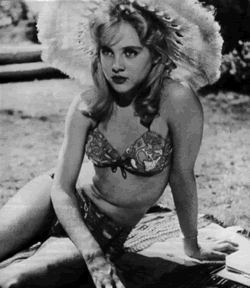 a room in the house owned by her oblivious mother, Charlotte Haze (Shelley
Winters). Initially Humbert attempts to keep his lustful thoughts hidden,
but after fate deals him a pleasant wild card, Humbert takes it upon himself
to become Lolita's guardian and escorts her on a debauched road trip. Unfortunately,
Lolita also catches the eye of Quilty (Peter Sellers), a man who uses various
disguises and voice tricks to win the eye of the young maiden. Everything
ends tragically, as all American morality tales must.
a room in the house owned by her oblivious mother, Charlotte Haze (Shelley
Winters). Initially Humbert attempts to keep his lustful thoughts hidden,
but after fate deals him a pleasant wild card, Humbert takes it upon himself
to become Lolita's guardian and escorts her on a debauched road trip. Unfortunately,
Lolita also catches the eye of Quilty (Peter Sellers), a man who uses various
disguises and voice tricks to win the eye of the young maiden. Everything
ends tragically, as all American morality tales must.
From the startling opening scene which veers abruptly from drunken comedy to (offscreen) violence), Kubrick manages to keep the tricky layers of narrative and subtext under admirable control. In fact, Lolita has aged marvelously well, brimming with wit and surprises thanks to the excellent performances by everyone involved. Nelson Riddle's champagne-flavored score (not to mention that catchy "yi-yi" song!) keeps the events flowing along despite the sordid undercurrents, and Kubrick's precise, elegant visual style aptly reflects Nabokov's evocation of a society rapidly going the way of Ancient Rome. As an adaptation of the novel, the film isn't completely successful, often swerving away from the venomous interior monologues offered by Humbert throughout the book (oddly enough, Kubrick later felt confident enough to tackle this narrative aspect successfully in A Clockwork Orange).
The Criterion laser presentation of Lolita supervised by Kubrick alternated between fullscreen and soft-matted (1.66:1) framing which seemed to cause more problems than it solved. Though fairly clean, the transfer was too soft and often broke the seductive flow of the film thanks to the jarring shifts in aspect ratio. The MGM laserdisc presented a more consistent hard matte of 1.66:1, which Warner has reproduced on its DVD incarnation. The DVD looks even crisper with darker blacks, though this also brings out a few more flaws in the source material (occasionally grain and dirt) which were not so readily apparent before. Still, it's a satisfying presentation and the best we'll see unless some unlikely soul down the road decides to perform a costly digital restoration job on the film. Also includes the U.S. trailer from the laser versions.
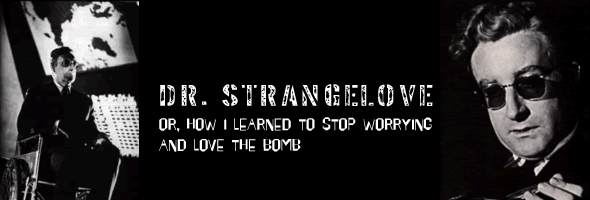
Starring Peter Sellers, George C. Scott, Sterling Hayden, Keenan Wynn, Slim Pickens, Peter Bull, James Earl Jones / Music by Laurie Johnson / Written by Stanley Kubrick and Terry Southern & Peter George / Cinematography by Gilbert Taylor
Format: DVD - Columbia
Letterboxed (1.66:1) - Full Frame / Dolby Digital Mono
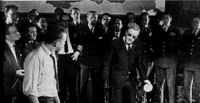 test
of time despite its timeliness (anyone who never experienced the Cuban
Missile Crisis probably won't experience the exact queasy effect this film
was intended to cause). Typically, the film is extremely slow-paced for
a comedy, often lingering on several straight scenes in a row before exploding
again into a moment of unexpected laughter, usually courtesy of Sellers'
three dynamic performances. In fact, Sellers is so astonishing that many
scenes without him feel bland in comparison, the film's only main weakness.
As usual, the crew behind the scenes does a top flight job, particularly
the eye-popping production design by Ken Adam (responsible for the most
memorable villain hideouts in the James Bond films) and Laurie Johnson's
militaristic score. Best of all, the ending still packs a punch, and it
would have been amazing to see this during its first run in American theaters.
test
of time despite its timeliness (anyone who never experienced the Cuban
Missile Crisis probably won't experience the exact queasy effect this film
was intended to cause). Typically, the film is extremely slow-paced for
a comedy, often lingering on several straight scenes in a row before exploding
again into a moment of unexpected laughter, usually courtesy of Sellers'
three dynamic performances. In fact, Sellers is so astonishing that many
scenes without him feel bland in comparison, the film's only main weakness.
As usual, the crew behind the scenes does a top flight job, particularly
the eye-popping production design by Ken Adam (responsible for the most
memorable villain hideouts in the James Bond films) and Laurie Johnson's
militaristic score. Best of all, the ending still packs a punch, and it
would have been amazing to see this during its first run in American theaters.
Like the Criterion laser, Columbia's DVD of Strangelove is struck from Kubrick's personal print of the film and switches between full frame (open matte - nothing is missing) and soft-matted 1.55:1. Kubrick's oft-expressed displeasure at the presentation of this film in theaters begs the obvious question of exactly how he did intend to have it shown, but apparently this version is what he wanted. As with most Columbia DVDs, the transfer has been performed with a great deal of care and, aside from the ragged opening titles, looks very good. None of the extras from the Criterion edition are retained here, but at a small fraction of the cost, this should please most viewers. No extras.
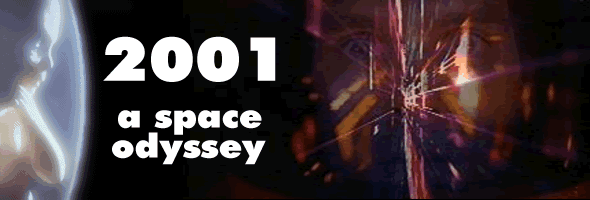
Starring Keir Dullea, Gary Lockwood, William Sylvester / Written by Stanley Kubrick & Arthur C. Clarke / Cinematography by Geoffrey Unsworth
Format: DVD - MGM
Letterboxed (2.35:1) / Dolby Digital 5.1
Obviously the ideal way
to see 2001 is in a theater, preferably in Cinerama, but the home
video versions have 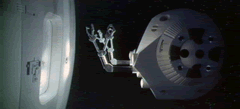 generally
fared well. The first widescreen release from Criterion looked good but
overly grainy, while MGM's meticulous 65mm restoration for laserdisc improved
both the color and clarity. The version was transferred verbatim to DVD
without anamorphic enhancement, presumably due to the film's upcoming theatrical
reissue (like The Wizard of Oz, this is apparently a title they'll
keep milking as long as the studio continues to exist). The transfer is
attractive if unremarkable; the special effects look accurate and the framing
appears to be perfect, but the dark scenes don't have quite the ominous
depth and richness usually delivered by a top notch DVD. The Dolby Digital
5.1 mix contains some effective directional effects but can't do much to
spruce up the "space Muzak" score pieced together from preexisting music
(it's a shame Kubrick nixed Alex North's wonderful score, which could have
taken this film to an even higher level). Incidentally, 2001 marked
the first occasion Kubrick recut his work after its theatrical release;
the film originally ran 12 minutes longer, but Kubrick made various trims
for reasons which remain mysterious. Perhaps the excised footage will turn
up someday, if it still exists. Bonuses here include a brief interview
with author Arthur C. Clarke and the tedious U.S. trailer.
generally
fared well. The first widescreen release from Criterion looked good but
overly grainy, while MGM's meticulous 65mm restoration for laserdisc improved
both the color and clarity. The version was transferred verbatim to DVD
without anamorphic enhancement, presumably due to the film's upcoming theatrical
reissue (like The Wizard of Oz, this is apparently a title they'll
keep milking as long as the studio continues to exist). The transfer is
attractive if unremarkable; the special effects look accurate and the framing
appears to be perfect, but the dark scenes don't have quite the ominous
depth and richness usually delivered by a top notch DVD. The Dolby Digital
5.1 mix contains some effective directional effects but can't do much to
spruce up the "space Muzak" score pieced together from preexisting music
(it's a shame Kubrick nixed Alex North's wonderful score, which could have
taken this film to an even higher level). Incidentally, 2001 marked
the first occasion Kubrick recut his work after its theatrical release;
the film originally ran 12 minutes longer, but Kubrick made various trims
for reasons which remain mysterious. Perhaps the excised footage will turn
up someday, if it still exists. Bonuses here include a brief interview
with author Arthur C. Clarke and the tedious U.S. trailer.

Starring Malcolm McDowell, Patrick Magee, Michael Bates, Adrienne Corri, Miriam Karlin, David Prowse / Music by Wendy Carlos / Written by Stanley Kubrick / Cinematography by John Alcott
Format: DVD - Warner
Letterboxed (1.85:1) / Dolby Digital Mono
 what our "humble
narrator" is saying. Thus, according to this train of thought, classical
music, artwork, and women in general are corrupt objects worthy of mistrust
at best. The film's extremely potent streak of humor also belongs to Alex
and reinforces the message that a twisted member of society is not so far
removed from normality as is so often assumed. On a more superficial level,
A Clockwork Orange is also a supremely well-crafted piece of entertainment,
slickly acted and performed, often disturbing, and strangely enough, nowhere
remotely as explicit as its reputation has suggested. Like The Texas
Chainsaw Massacre, most of the violence is brutal and often difficult
to watch but committed from a great distance or off-camera, allowing the
viewer's imagination to unpleasantly fill in the blanks. Oddly, Anglophile
Kubrick omitted the final chapter from Burgess' novel in his adaptation
(presumably because he only read the U.S printing), which would have ended
the film on a more sincere and positive note.
what our "humble
narrator" is saying. Thus, according to this train of thought, classical
music, artwork, and women in general are corrupt objects worthy of mistrust
at best. The film's extremely potent streak of humor also belongs to Alex
and reinforces the message that a twisted member of society is not so far
removed from normality as is so often assumed. On a more superficial level,
A Clockwork Orange is also a supremely well-crafted piece of entertainment,
slickly acted and performed, often disturbing, and strangely enough, nowhere
remotely as explicit as its reputation has suggested. Like The Texas
Chainsaw Massacre, most of the violence is brutal and often difficult
to watch but committed from a great distance or off-camera, allowing the
viewer's imagination to unpleasantly fill in the blanks. Oddly, Anglophile
Kubrick omitted the final chapter from Burgess' novel in his adaptation
(presumably because he only read the U.S printing), which would have ended
the film on a more sincere and positive note.
Though derived from the same materials used for Warner's widescreen laserdisc, the DVD of A Clockwork Orange looks markedly better, with smoother colors and less video noise. Like the laser reissue, this is actually the original X-rated print with the entire "William Tell Overture" sequence which was visually altered to obtain an R rating upon the film's theatrical reissue. It may not be first-rate demo material, but the DVD gets the job done and conveys the film's wild visual schemes relatively well. The 1.66:1 framing reveals more at the top and bottom than the theatrical version, while a few sequences (the opening titles, newspaper headlines, etc.) are hard-matted at 1.85:1 as originally shot. The DVD also includes the 1971 theatrical trailer, which may give Japanese seizure cartoons a run for their money.

Starring Ryan O'Neal, Marisa Berenson, Patrick Magee, Hardy Kruger, Steven Berkoff / Written by Stanley Kubrick / Cinematography by John Alcott
Format: DVD - Warner
Letterboxed (1.66:1) / Dolby Digital Mono
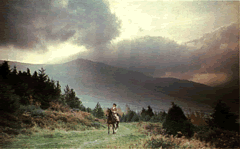 level,
Barry Lyndon is also one of Kubrick's most controlled and best-realized
efforts, with his typically piecemeal classical score functioning better
than usual thanks to the careful orchestrations of Leonard Rosenman (who
makes particularly good use of Handel's "Sarabande"). Despite the absence
of shock value or trippy visuals, this is ultimately pure Kubrick and well
worth the hefty time investment.
level,
Barry Lyndon is also one of Kubrick's most controlled and best-realized
efforts, with his typically piecemeal classical score functioning better
than usual thanks to the careful orchestrations of Leonard Rosenman (who
makes particularly good use of Handel's "Sarabande"). Despite the absence
of shock value or trippy visuals, this is ultimately pure Kubrick and well
worth the hefty time investment.One of the most visually stunning films of its day, Barry Lyndon in many ways represents the height of Kubrick's exacting eye for minute detail. Each costume, each shot, each note of music is precisely applied and presented for the maximum aesthetic effect; however, this austere and literary approach may not be to all tastes. The DVD looks better than the laserdisc, which was flawed by a speckled pressing, and effectively renders the powdery textures of the landscape shots. Like the other Kubrick titles, the technical limitations of the sound recording prevent it from really bursting forth, but the audio is more pleasing and well-rounded than most films of its era. Also includes a lengthy "the critics are raving" trailer.
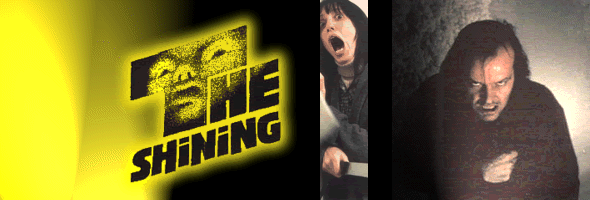
Starring Jack Nicholson, Shelley Duvall, Danny Lloyd, Scatman Crothers, Barry Nelson, Joe Turkel / Music by Wendy Carlos / Written by Stanley Kubrick / Cinematography by John Alcott
Format: DVD - Warner
Full Frame / Dolby Digital Mono
Most obviously, The Shining contains some of the most indelible images of the horror genre: the blood-spilling elevator, the two girl ghosts, Nicholson's axe-wielding chase through the snowy maze. However, the film is unsettling for other, more intangible reasons as well, particularly through its manipulation of time and space. The film is broken up by title cards ("Closing Day," "4 A.M.," etc.) which become increasingly meaningless as the story progresses and the present and past begin to merge into a horrific jumble of images and sounds. The collision of the spiritual and physical planes becomes complete when first Jack and then Wendy begin to physically witness the apparitions, and the ghosts even intrude on the physical level by unlocking a door. While a number of horror films achieve their power through psychological suggestion (The Haunting being the most obvious example), The Shining takes an entirely different approach of horror through sensory accumulation. Rather than being showstopping moments of terror, the film's progression of chills operates like a near-death experience-- the full impact doesn't register until hours later when the viewer thinks back on the film and suddenly begins to shiver at how it all locks together. Wendy's discovery of Jack's manuscript in essence sums up the approach of the film - just one page is a little creepy and strange, but in context with the whole work, it's simply terrifying. More than perhaps any other Kubrick film, The Shining also relies heavily upon its actors to carry the film, and while Nicholson is indeed a wonder to behold in his bulldozer psycho performance, Duvall is his equal on every level, conveying a normal woman brought to the threshhold of hysteria. Significantly, in 1998 King took a shot at literally translating his novel into a TV miniseries and, while fairly successful overall, the more recent version proved that many of Kubrick's choices (such as omitting the haunted topiary animals) were sound indeed. The film's final image, the harshest object of criticism back in 1980, makes sound narrative sense in retrospect and works far better than the soppy feel-good ending King himself tacked onto the miniseries.
Sadly, the Warner DVD is not all it could have been. Kubrick preferred the film to be presented completely open matte (even in theaters, though few projectionists complied), and that's how it has existed on video since its first release in the early '80s. The laserdisc transfer remains the best of the bunch; while the DVD is obviously derived from the same materials, the increased clarity of DVD increases the grain in a number of shots. Worse, the color on the DVD has been pulled back, so the lovely burnished golds of the ballroom and the rich, ruby red of the elevator blood scenes have almost completely disappeared. Though it doesn't do the film justice, the transfer is at least watchable --and thankfully Warner didn't succumb to overzealous letterbox mania by slapping a false matte over the image like a number of other recent DVD releases (and the recent "letterboxed" Japanese LD release). On the positive side, at least the film can be watched all the way through now without the distraction of side breaks, and more importantly, this also contains the creepy U.S. trailer and - at last! - Vivian Kubrick's notorious half hour documentary, Making The Shining. This astonishing chamber piece features interviews with the principal cast and shows Kubrick at work, several times cursing Shelley Duvall presumably in an attempt to shake her into character. Duvall comes off as something of a flake here, while Jack comes off as... well, Jack. Great stuff, and almost worth the price tag by itself. Throw those old bootleg tapes away, folks. Unfortunately, there's one supplement we'll probably never see: a two minute epilogue present in some first run theatrical prints which finds the film's survivors in the hospital. Since Kubrick had the film recalled and reedited, his estate will probably never release it; too bad. Incidentally, most European release cuts of this film, including the video, run a relatively scant 118 minutes; seeing the complete version on DVD should be a revelatory experience, to say the least.
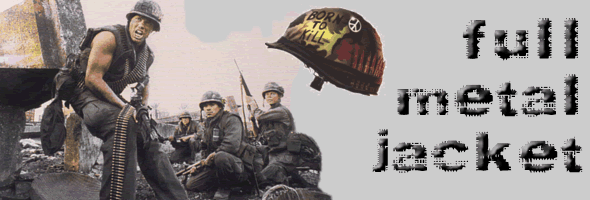
Starring Matthew Modine, Adam Baldwin, R. Lee Ermey, Vincent d'Onofrio, Dorian Harewood, Arliss Howard / Music by Wendy Carlos / Written by Gustav Hasford, Michael Herr & Stanley Kubrick / Music by Abigail Mead (Vivian Kubrick) / Cinematography by Douglas Milsome
Format: DVD - Warner
Full Frame / Dolby Digital
Mono
Just as every filmmaker in the '70s had to do
a Hitchcock homage, the '80s found most major directors tackling the previously
touchy subject of Vietnam. Most of the results were terrible handwringers
(check out Coppola's Gardens of Stone), while the one that started
it all, Oliver Stone's Platoon, has aged so badly it now plays like
a weak TV movie. Arguably the best of this trend, Kubrick's Full Metal
Jacket, has improved over the years, though its flaws remain undeniable.
The biggest problem, of course, is that the first 45 minutes are so blistering,
powerful, and simply perfect that there's no way the film can recover in
its aftermath. After standing at what seems like the gateway to the inferno
for the first act, the ultimate descent into Vietnam is well-crafted but
ultimately a conventional return to territory Kubrick explored earlier
in Paths of Glory. However, as a depiction of war, Kubrick's treatment
is technically brilliant and obviously influenced the similar Saving
Private Ryan.
